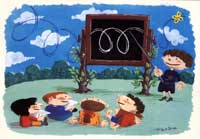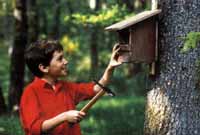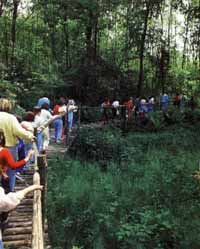|
Education
as a priority activity of Parks
|
 |
|
 n
Autumn 1997, the meeting "a park as a school" promoted by the Italian
Interministerial Technical Committee for Environmental Education
outlined a new profile of the educational
role for the National Parks which supplements the more
traditional role. This new educational role of the parks cannot
be seen as a secondary option in comparison with the roles of nature
protection and of economical development. A strategy of the Park
Authorities for education cannot be considered as an integrating
and fundamental part of the parks evolution towards sustainable
development. n
Autumn 1997, the meeting "a park as a school" promoted by the Italian
Interministerial Technical Committee for Environmental Education
outlined a new profile of the educational
role for the National Parks which supplements the more
traditional role. This new educational role of the parks cannot
be seen as a secondary option in comparison with the roles of nature
protection and of economical development. A strategy of the Park
Authorities for education cannot be considered as an integrating
and fundamental part of the parks evolution towards sustainable
development.
We propose here some contexts of action
where the WWF, through its local operational network, can collaborate
with and help the old and new Parks along this fascinating but difficult
path.
|
 |
|

A park has always been seen as an ideal place for school trips,
even though this kind of excursions have not yet reached the levels
of spread and continuity now typical of school tourism in the old
cities. The parks must be able to develop their capabilities to
offer reasoned didactic programs
to the schools; this is the way to go over the occasional and "no-charge"
features of this kind of visits. On the contrary, school trips should
be occasions to carry out thorough studies
and investigations to include in the didactic programs.
For more than ten years, the WWF has
organized school camps and trips that it spreads in all the Italian
schools: a very wide experience that can be used by the parks to
structure their offer for the schools visiting the park.
|
 |
|

The parks must be considered and can also and mostly become real
laboratories where schools and visitors can take part
in or verify a concrete program towards sustainable development.
A protected area that started the difficult way towards sustainable
development can enhance its effort and turn it into a specific added
value in that area. Therefore, the park can propose to the schools
not only the traditional naturalistic/cultural programs (which give
evidence of the past and present situation of the area), but also
social/economical programs about the "sustainability" (which give
evidence of the possible and desirable futures of the region).
For the school year 1998-1999, the WWF
has promoted a program called "Sulla terra in punta di piedi" (on
the earth on tiptoe), a didactic program for primary and secondary
schools on sustainable development. The WWF can help the park to
identify and design in collaboration with the local operators
interested in the activity some didactic programs which allow
the schools to try and interact with the actions and programs for
sustainable development.
|
A
boy is setting a nesting box in the woods

|
|

In the above-mentioned context, the schools within the park areas
play a key-role. The educational action of the parks are usually
and mostly addressed towards the schools visiting the park. The
schools of the Parks, on the contrary, represent not only a vital
service for the survival of
local communities, but they also often represent the
only or main cultural structure in the area; in this context, they
can play if they are adequately addressed and helped a central
role for sustainable tourism. The school - in line with the most
advanced guide-lines of the national education policy becomes
a subject able to establish relationships with the Park and Local
Authorities both to express their needs and to propose cultural
actions to the community aimed at enhancing the area
and start processes of sustainable development.
The WWF has just launched a pilot-project to create networks of
schools synergically working in the network in order to establish
a dialogue with the Local Authorities and the Park Authority. This
project, which can be extended to all the parks, may represent the
most qualifying activity for the growth of the educational system
of the parks and to build up an "educational community" in the park.
This kind of community knows its needs and potentialities, it is
able to establish a dialogue on an equal basis with the park authority
and plan its own future. The WWF has also developed a remarkable
experience in "facilitating" mixed workshops between the various
social, cultural and economical components and is able to collaborate
with the park authorities in managing these processes.
|
School
during an excursion in a wood

|
|
The
opportunities of
comprehensive schools
The "finishing stroke" for the small rural centers is often given
when the schools of the village close down because of the lack of
children. The closing down of schools often forces young couples
to abandon the small villages and move to areas with better services,
depriving the community of those energies and human resources which
are the only factors that can guarantee their survival and development.
A good tool for the survival
of schools in rural areas and for the promotion of the above-mentioned
type of school is the so-called "comprehensive
schools". The comprehensive school project comes from
the need of public administration to reduce
management costs of decentralized school structures in
rural areas, because of the big decrease in the number of children
in each school. If kindergarten, elementary and low secondary school
children are gathered in one administrative structure, it is possible
to reach the critical minimum number
of children that allows to keep a school structure in areas with
a low density of population. Beyond this purely administrative importance
- they also have a clear social importance - comprehensive schools
showed other unexpected virtues, for this model has often been "exported"
even in various urban areas.
The WWF is ready to help Local Administrations
of Parks in these choices, in order to allow not only the conservation
of as many school structures as possible, but also the development
of a rational network of schools that are able to establish positive
relationships with the local communities.
|
|
| Education
as a priority activity of Parks (1 of 2 ) |
   |
|
|
